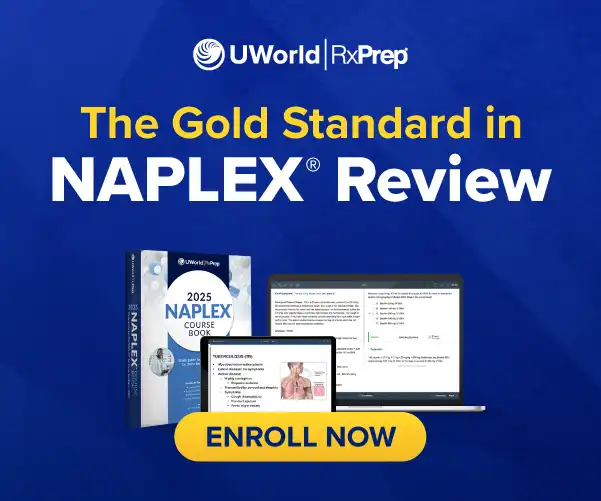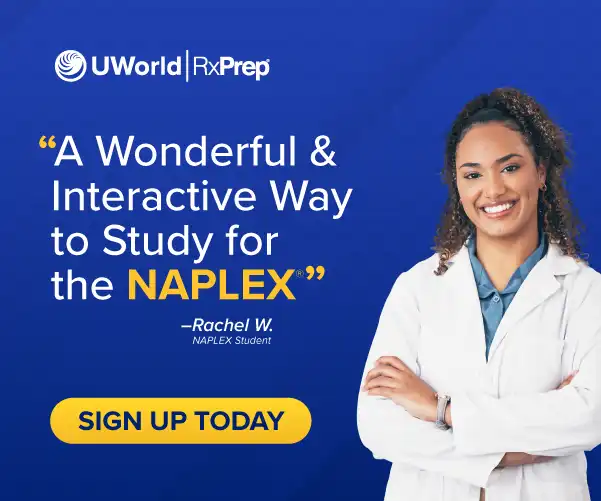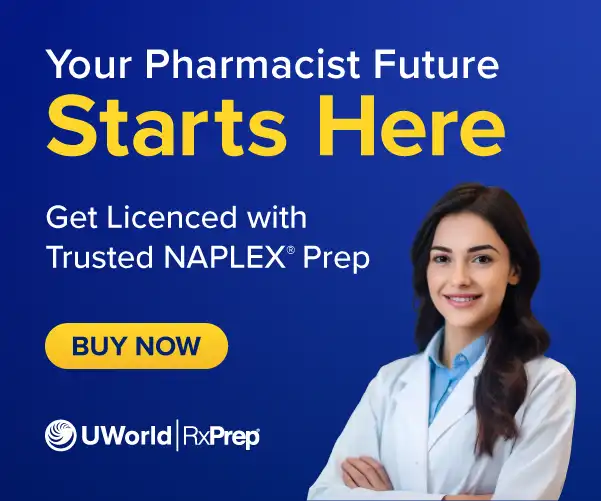As a dedicated pharmacy student with a bright future on the horizon, you know that the ASHP Midyear Clinical Meeting is more than just another conference. It’s an unmatched opportunity to explore diverse career paths and network with industry leaders.1 Whether you’re interested in clinical practice, a residency program, an industry fellowship, academic research, or are still solidifying your plans for the future, let us help you make the most of your time at ASHP.
Here is our list of must-attend events, insightful questions to ask industry experts, and insider tips gathered from students who have been in your shoes. Each section of this resource is tailored to match your specific career aspirations — whether you’re interested in clinical practice, a residency program, an industry fellowship, academic research, or are still solidifying your plans for the future.
For Students Pursuing Patient Care
If you aim to work full-time after graduating from pharmacy school, ASHP’s Midyear Clinical Meeting provides valuable career resources to help you bridge gaps between classroom knowledge and real-world clinical practice.
Hone in on workshops designed to teach practical patient-care skills and help you face the job market once you finally flip that tassel. Seek out ASHP sessions and events that teach the requirements of entry-level roles, necessary skills for clinical positions, and employers' expectations for new clinicians.2
Key Sessions and Events
ASHP’s sessions offer targeted insights on pathways to all patient care roles in pharmacy, including community pharmacy and retail chains, specialized hospital departments, ambulatory care, and outpatient clinics. Prioritize sessions that cover topics such as patient care strategies, medication therapy management, clinical decision-making, or other hands-on skills required to succeed in the field.
Additionally, take time to participate in networking opportunities created for you to connect with full-time employers from hospitals, clinics, and retail chains that align with your career interests. These are only some of the beneficial ASHP events for future clinical care professionals.
Personnel Placement Service (PPS)
PPS is the largest in-person job fair in pharmacy and a must-attend event for future clinicians. It includes the opportunity to interview with hiring managers from all pharmacy sectors, including chain pharmacies, hospitals, faculty positions, and other full-time roles.
Skipping PPS as a future clinical pharmacist would be like skipping auditions if you want to be on Broadway. However, this event does require a separate registration process and fee in addition to the initial ASHP registration.
If you are interested in PPS, you’ll need to register for PPS now. After doing this, you’ll get access to the PPS Application Portal, where you can browse ASHP’s virtual job board to view open positions and schedule interviews with employers in advance.
This event is a series of product demonstrations that will give you hands-on exposure to the latest technologies and products in pharmacy. You'll benefit from learning about tools that are actively improving patient care.
This program is also a networking opportunity, allowing you to connect with industry professionals and potential employers from different pharmaceutical companies. The Exhibit Program also offers free professional headshots to give you a leg up when kickstarting your clinical career.
Many ACPE-accredited schools will choose to participate in the ASHP-sponsored Clinical Skills Competition. In this team-based contest, you’ll work through timed case studies that require you to assess patient information, identify drug therapy issues, and create care plans for each patient. If your team wins, you will advance to ASHP to present your work.
The Clinical Skills Competition is an ideal way to put your hands-on skills to the test in a low-stakes environment by simulating real-world medical scenarios. Participating in this contest can help prepare you for the unexpected clinical demands of patient care. Check with your pharmacy school to see if they are participating in the preliminary rounds.
ASHP hosts several roundtable discussions with clinical experts and industry leaders on key topics. Past years have included roundtables on Pediatrics, Critical Care, Emergency Medicine, and Ambulatory Care, each hosted by clinical experts and pharmacy leaders from each specialized area.
These roundtable conversations are a gold mine if you’re seeking wisdom from current clinicians. You’ll hear the daily challenges and expectations in their clinical specialties, preparing you for what lies ahead in the field.
Tips for Students Planning to Enter Patient Care
If you’re planning to go straight into clinical practice after graduation, keep 3 goals in mind at ASHP: improving clinical knowledge and skills, strengthening your credentials to prepare for the job application process, and learning about the daily aspects of clinical care roles from experienced professionals.
To do this, past ASHP conference attendees recommend that you:
- Take time before the conference begins to download the ASHP mobile app and find pharmacists from clinics or hospitals where you’d like to work. Then, make specific plans to attend all of the sessions where those companies will be present.
- Network directly with future employers. This can happen at formal networking events such as PPS or in more candid, informal moments in the elevator at the hotel. Prepare a 30-second elevator pitch for employers that includes your year in school, which pharmacy school you attend, and internships or experiences you’ve had that are related to the role.
- When networking, rather than asking for jobs directly, prioritize building relationships with employers by discussing your mutual industry interests and asking them thoughtful questions about the work they do.
- When listening to clinicians answer questions about their jobs, pay attention to the details of their daily work and then ask follow-up questions. Think about the specifics of their daily life, such as their weekly schedule, their patient demographic, the culture of their clinic, the pace of their specialty, and more. Ask yourself, “Is this type of clinic, hospital, or retail chain an environment I see myself thriving in?” not just “Am I interested in this broad care category?”
- Bring paper copies of your resume and business cards to the conference to pass out to future employers in the exhibition hall and additional networking events.
Questions to Ask
Many of the ASHP roundtables and speaker sessions will include opportunities for you to ask questions at the end. It’s best to go into these moments already prepared with thoughtful questions such as:
About career pathways:
- How do community pharmacy and clinical pharmacy differ, and how can I determine which path is right for me?
- What are the main differences between hospital and ambulatory care settings, and how do I know which one aligns with my goals?
- What steps can I take to specialize in the area of clinical pharmacy that interests me?
- Which area of pharmacy do you specialize in, and what led you to choose that path?
- What additional certifications or training are needed for careers in specialized pharmacy fields?
- What types of advancement or specialization opportunities have you encountered in your career?
About the daily life of a practicing pharmacist:
- How do clinical pharmacists manage direct patient care alongside other responsibilities?
- What aspects of your role do you find most fulfilling?
- What are the biggest challenges you face as a pharmacist, and how do you work through them?
- How much of your time is dedicated to counseling patients on their medications?
- Which diseases or conditions are most commonly associated with the prescriptions you fill?
- How do you navigate ethical challenges in your practice?
About career advancement:
- Which skills are most critical to your day-to-day work?
- How do you stay engaged in continuous learning and professional growth in your career?
- In your current role, how do you collaborate with other healthcare professionals?
- What advice would you offer to students who are thinking about a career in pharmacy?
- What guidance would you give when choosing among various pharmacy career paths?
About the pharmacy industry:
- How has the pharmacy field evolved since you first began practicing?
- How have you adjusted to shifts in healthcare delivery and advances in pharmacy technology?
- In your view, what role will pharmacists play in the healthcare landscape over the next 5-10 years?
- What do you see as the biggest challenges currently facing the pharmacy profession?
For Resident Candidates
ASHP is a highly valuable event for students planning to apply for a residency program after graduation. Use your time at the conference to connect with program representatives and start conversations about the ins and outs of each residency program present at the conference. These conversations will boost your chances of securing a spot in your top residency choice while helping you determine which programs best align with your goals and preferences.3
Key Sessions and Events
Key sessions worth attending as a resident candidate include workshops focused on advanced clinical skills involved in residency training, such as verifying medication orders, participating in medical codes, and conducting patient case discussions.
You should also prioritize sessions that discuss the career benefits of a residency, from developing marketable skills to improving employment prospects. ASHP has many valuable sessions and events for resident candidates; these are only a few of the highlights.
This is a must-attend event if you’re hoping to secure spots in a residency program after graduation. With a walk-up, booth-style format and no scheduled interviews required, you’ll have the chance to connect directly with residency program representatives, learn about each program’s unique offerings, and gather residency information on a first-come, first-served basis.
The Residency Showcase allows you to make valuable connections and get a firsthand sense of the specific programs that align with your career goals. Be sure to prepare questions for representatives beforehand and bring your CV to each booth.
Personnel Placement Service (PPS)
If you’re hoping to join a residency after graduation, you should definitely register for PPS. PPS provides structured, 1-on-1 interview slots with residency program representatives, giving you a unique chance to connect directly with program directors and showcase their qualifications.
To make the most of PPS, register in advance and research programs thoroughly. Although PPS requires a separate registration and fee, the chance to engage in focused interviews, practice communication skills, and expand your professional network makes it a worthwhile investment on your journey toward securing a spot in your dream residency program.
Residency-Focused Educational Sessions
Residency-focused sessions provide guidance for students navigating the application process, from interview tips to strategies for success. Workshops led by experienced pharmacists and program directors delve deeper into crafting standout CVs and personal statements, ensuring students are well-prepared.
Several sessions also include panel discussions with current residents to provide firsthand insights into residency life. Past sessions include "Perspective Pearls: Navigating the Residency Program Tsunami" and "Let's Remove the Mask: Shining Light on Community-Based Pharmacy Residency Programs."
Student’s Night Out
An underrated ASHP event, Students’ Night Out offers a relaxed setting for you to connect with fellow pharmacy students and current residents and unwind after a long day of conference activities. This event fosters camaraderie and provides a valuable opportunity for you to have informal discussions with other students about different residency programs, share experiences, and gather insights about career aspirations.
Tips for Pharmacy Resident Candidates
Keep 3 main goals in mind at ASHP: prioritizing building meaningful connections with program representatives, understanding the ways each program aligns with your goals, and making a strategic plan ahead of time to connect with high-priority residencies.
To do this, past attendees recommend that you:
- Ask residency program representatives if their program has an upcoming open house, either virtually or in person. Put those events on your calendar and make a plan to attend. ASHP attracts 8,000 pharmacy students each year, so it’s wise to connect with representatives in a smaller setting after the conference.
- If you don’t have time to talk to every program representative on your list, prioritize programs you haven’t connected with before and out-of-state programs you may not get the chance to connect with afterward.
- Don’t rush conversations with residency representatives just to speak with every program. Doing this is unprofessional. Focus on gaining career insights and building connections. This conference is not your only chance for residency interviews and in-person networking.
- Instead of using a single, generic CV for all of the residency programs, go into the Residency Showcase with tailored CVs for each. Each program values different skills and experiences, so creating custom CVs highlights what's most relevant to each program.
- As you visit with program representatives, make a list of the attributes that you like and don’t like about each program. This way, you can compare programs when you get home to make a more informed decision about your future.
Questions to Ask
Arrive at ASHP prepared to ask informed questions to current residents and program directors. Use these questions lists to create a clearer picture of the skills each program emphasizes, the experiences they offer, and which residency might best align with your goals:
About daily life in each residency program:
- What does a typical resident schedule look like, including rotations and on-call hours?
- How do residents interact with each other and engage with faculty in this program?
- What measures does your program take to support resident wellness and work-life balance?
- Are there team-building or social events organized for residents?
- What support is provided for residents who may face academic or personal challenges?
- How are holiday coverage responsibilities shared among residents?
- How often are residents scheduled for on-call shifts?
- Are there any unexpected costs related to living in this area?
- Does the program offer an orientation to help new residents adjust?
- What changes have been made to the program in response to resident feedback?
About residency program opportunities:
- What would you say are the main strengths and areas for improvement in this residency program?
- In what ways does the program support residents’ professional growth and future career paths?
- What research or scholarly activity opportunities are available for residents here?
- How is mentorship structured within the program?
- Are there options for residents to take on moonlighting work?
- If you could change one aspect of the program or the opportunities it offers to residents, what would it be?
About the application process:
- What personal qualities do you look for in a resident?
- What aspects do you prioritize when evaluating residency applications?
- How can I make my application stand out from others?
- What are the key differences between PGY1 and PGY2 residencies, and how can I decide which aligns best with my goals?
- Are there specific experiences or qualifications you expect applicants to have?
- What is the application deadline, and do you have preferred submission formats?
- How many letters of recommendation do you require, and who would be the ideal recommenders?
- What should I focus on in my personal statement?
- What should I anticipate during the interview process, and what types of questions are typically asked?
- Are there any common mistakes applicants make that I should be aware of?
- If I’m not selected, would you provide feedback on my application or interview performance?
About careers after residency:
- What paths do most of your residents take after completing this residency (e.g., PGY2, fellowship, clinical roles)?
- What types of positions do residents from this program typically pursue after graduation?
- Which skills or experiences gained in this program are most valuable for securing positions afterward?
- Are there opportunities for residents to take on leadership roles or participate in committees during training?
- How does the program support residents in preparing for board certification or other professional credentials?
For Industry Fellowship Seekers
If you hope to pursue an industry fellowship after graduation, use the ASHP Midyear Conference as a guide to the different career paths available to industry pharmacists. By asking the right questions to industry leaders, you’ll be able to better prepare for an impactful career outside of the traditional pharmacy setting.
At ASHP sessions and events, you’ll learn how each industry fellowship in the pharmaceutical and biopharmaceutical sectors can offer experiences that positively transition students from pharmacy school to industry roles. Seek out sessions that include information on specialized training in fields such as clinical development, medical affairs, regulatory affairs, or pharmacovigilance.4
Key Sessions and Events
By attending these targeted panels, sessions, and networking events, you’ll meet established drug development, marketing, and health economics professionals, building lasting connections crucial for success in these roles. ASHP provides a variety of important sessions and events tailored for industry fellows; here are some vital ones to attend.
Industry Fellowship Open House
New in December 2024, this free, open-house-style event is a unique chance to connect personally with fellowship program representatives before the conference rush begins. P1-P3 students can use this event to get a feel for different industry fellowships and learn more about the career path, while P4 students can connect with programs informally during the application and interview process.
The Student Poster Sessions at ASHP are a valuable opportunity for you to secure competitive spots in industry fellowship programs. These sessions provide a platform to showcase projects such as case reports or evaluative studies while engaging directly with peers and industry professionals in an approachable setting.
Presenting at the poster sessions allows you to highlight your analytical and communication skills — key attributes sought after in fellowship candidates — and gain feedback to refine your work. This experience demonstrates your ability to convey complex ideas effectively, a critical skill for success in the pharmaceutical industry. Participation requires advance registration through the ASHP poster submission site.
Pharmacy Student Leadership Development Workshop
The Pharmacy Student Leadership Development Workshop is an opportunity for you to secure industry fellowships. This workshop focuses on building essential leadership skills such as teamwork, problem-solving, and decision-making, qualities highly valued in fellowship candidates.
Through interactive sessions and real-world scenarios, you’ll practice leading, collaborating, and making industry-centric business decisions, which are critical for managing projects and teams. Additionally, the workshop offers networking opportunities with peers, faculty, and industry professionals, helping you connect with mentors and gain insights into fellowship programs.
Tips for Future Industry Fellows
Focus on 3 main goals at ASHP: building strong connections with fellowship representatives, assessing how each program fits with your long-term career goals, and asking insightful questions to representatives from your top-choice programs to gain clarity and make a lasting impression.
To do this, past attendees recommend that you:
- Focus more on your industry-related curiosities and passions than trying to say the right thing. These programs are looking for fellows with a genuine, authentic passion for the industry, not students who can produce carbon-copy interview answers.
- While speaking with fellowship program representatives, jot down the strengths and weaknesses of each program. These notes will help you reflect on your options later and choose the fellowship that best aligns with your career goals.
- If you’re a member of a professional pharmacy organization, mention this when talking to industry professionals. This shows representatives that you care about being involved in the pharmacy industry as a whole and not just succeeding in school. If you are not part of an organization like this, consider joining after Midyear.
- After the conference, follow up with programs via email or Linkedin. In your message, mention specific details from your conversation so that they remember you.
- Avoid relying on a one-size-fits-all CV for industry fellowship programs. Instead, craft personalized CVs that highlight the specific skills and experiences each program values, ensuring you present yourself as the ideal candidate for their unique focus.
Questions to Ask
By engaging with current fellows and industry professionals, you can gain insights into the benefits of these programs, the skills developed, and the ways each fellowship can lead to specific career opportunities.
Asking the right questions to industry professionals will help you identify the fellowship experience that best matches your long-term goals in the pharmaceutical industry.
About the industry fellowship application process:
- What is the application timeline for your program, and are there any key deadlines to keep in mind?
- What skills or experiences do you value most in applicants to your fellowship program?
- What attributes or accomplishments have helped previous fellows succeed in your program?
- What advice would you offer to applicants looking to make their application stand out?
- Can you walk me through the application process and provide tips for being a competitive candidate?
- What are the most common mistakes applicants make during the fellowship application process, and how can I avoid them?
About the industry fellowship structure and program details:
- What is the typical day-to-day work environment like for fellows in this program?
- How is fellow performance monitored during the program, and what feedback methods are in place?
- How do you assess the success of your fellows both during the program and after completion?
- What kinds of projects do fellows typically work on during the program?
- Can you outline the structure of your fellowship?
- How is the program divided between hands-on experience and academic coursework?
- Are fellows involved in research or clinical projects, and how are these opportunities organized?
- Does the fellowship emphasize specific therapeutic areas or focus on particular fields of study?
- How do you gather and incorporate feedback from current and past fellows to enhance the program?
- What does the compensation package for your fellowship include, and what additional benefits are offered?
About mentorship and career outcomes:
- How is mentorship incorporated into your fellowship program, and who typically serves as a mentor?
- What resources are provided to support professional growth during the fellowship?
- In what ways does the program help fellows develop professionally and build industry networks?
- Are there opportunities for fellows to work with teams or departments outside their primary focus?
- What kind of support do fellows receive for publishing research or preparing scholarly work?
- Are fellows encouraged to attend or present at national conferences during their fellowship?
- How does your program stay aligned with the evolving needs of the pharmaceutical industry?
- How does your program prepare fellows for transitioning into full-time roles after the fellowship?
- Can you share examples of successful fellows and how they advanced their careers after the program?
- How does your fellowship differ from others offered by similar organizations?
For Students Pursuing Academic Research
If you’re planning a career in research pharmacy or academia, ASHP offers valuable opportunities to explore this path. With sessions on cutting-edge research, pharmacy education, and professional development, the conference helps you connect with academic leaders and researchers.
You’ll gain insights into faculty roles, research expectations, and additional training opportunities, preparing you to shape the future of pharmacy research.5
Key Sessions and Events
Attend sessions on research methods, academic career development, and pharmaceutical advancements. Seek out workshops on publishing, grant writing, and collaboration, and explore poster presentations for insights into cutting-edge research. Networking with faculty and researchers can provide valuable guidance for excelling in academia. There are many opportunities for researchers at ASHP. Here are a few must-attend events.
The Student Poster sessions are a huge deal at ASHP. These sessions provide a platform to showcase your research through descriptive reports, evaluative studies, or case reports, allowing you to engage directly with peers and professionals in an informal setting.
Presenting your work during the poster sessions offers the chance to gain feedback from attendees and demonstrate your research skills, which are critical for academic and faculty roles.
If you’re pursuing a career in academia, this experience highlights your commitment to advancing pharmacy knowledge and builds confidence in presenting your findings, an essential skill for success in academic roles. To participate, you must sign up in advance through the ASHP poster submission site.
ASHP hosts roundtable discussions with research-focused experts and academic leaders on topics highly valuable for future research pharmacists. Past topics include healthcare disparities in pediatric populations, antimicrobial stewardship, therapeutic drug monitoring, medical marijuana use in children, and more.
These discussions allow you to hear about the latest pharmacy research directly from research pharmacists and thought leaders, giving you a deeper understanding of the medical challenges and questions shaping the field. Review the roundtable line-up beforehand so you can engage meaningfully and ask questions that align with your academic or research interests.
Educational Sessions
Various research-focused sessions at ASHP cover essential topics such as study design, data analysis, research protocols, and publishing in pharmacy, providing a strong foundation in methodologies. Specialty-specific sessions allow you to dive deeper into research in areas like oncology, critical care, and pediatrics, while workshops on grant writing and funding offer practical insights into securing research support. You’ll also find sessions that help you approach academic pursuits with a growth mindset and overcome challenges like imposter syndrome.
Attending sessions on technology and informatics can be particularly useful as research increasingly involves data analysis tools, while sessions on research ethics ensure students understand IRB processes and ethical considerations. Past ASHP sessions that provide value to students with academic aspirations include "Working Collaboratively with Artificial Intelligence (AI) in Your Future Career” or "Feeling Like a Fraud? How to Manage Imposter Syndrome in Learning."
The Exhibit Program is a series of product demonstrations that showcase innovative technologies shaping the future of pharmacy research. Promotional theaters and learning labs offer a closer look at current therapeutic focuses and industry trends, giving attendees a deeper understanding of the industry's current trends.
This is also a prime networking opportunity that can connect you with industry professionals and companies at the forefront of pharmacy research and development. These conversations can lead to potential research collaborations, mentorships, or insights into career pathways in academia and research.
Tips for Students Pursuing Academic Research
Use ASHP to focus on building meaningful connections with experienced researchers and academic professionals. Explore research opportunities and career pathways that align with your goals while staying curious about the latest advancements and trends shaping the pharmacy field.
To do this, past attendees recommend that you:
- Talk to representatives from companies doing research that matters to you. If you have any internship or clinical experience that connects to their field, don’t hesitate to mention it. If you don’t have previous experience, ask the representatives questions about the work they do to show interest and curiosity. Pay extra attention to the steps they took to get their positions.
- Don’t hesitate to ask industry leaders if they mentor students and have room to accept new mentees. Many researchers thoroughly enjoy supporting students in this way. Don’t worry about wasting their time. Remember, these industry leaders are passionate about advancing the field and value helping bright students reach their potential!
- In conversions with research pharmacists, lead with passion. If you’re pursuing research, you likely have a passionate curiosity about the industry. These conversations are not the time to be humble, but instead to make your drive and devotion to the field known.
- Set up a time before you leave for ASHP to talk to your own professors about the conference. No one knows the research field better than them. Ask them for advice on which clinics, speakers, or sessions would be best to attend, depending on the topic of your thesis or capstone project.
- After ASHP, join pharmacy networks on Linkedin, such as the "Pharmacy Publishing Network.” Make a point to connect with industry leaders that you met at the conference and send a follow-up message referencing specific details from your conversation.
Questions to Ask
Take advantage of ASHP’s open forums with research pharmacists to ask questions and gain expert insight into the impact of their work. Come prepared with a list of questions that will help you gain insight into pharmacy research trends and predict how you might contribute to the field in the future.
About starting a career in pharmacy research:
- Did you begin your pharmacy research after graduating, or did you transition from clinical pharmacy to research or academia?
- What qualifications are essential for pursuing a career in academia?
- How can students or new graduates get involved in pharmacy research?
- What advice would you give to a pharmacy student who wants to develop a research question or project?
- How do you approach creating a research question in pharmacy, and what strategies do you use to identify knowledge gaps?
- What research skills or experiences do you believe are most important for someone pursuing a career in pharmacy research or academia?
- Which scientific journals do you read regularly or recommend to aspiring researchers?
About conducting and publishing your own research:
- What are the key factors to consider when designing and conducting pharmacy-related research studies?
- What common challenges arise in designing and implementing clinical trials in pharmacy, and how do you address them?
- How do you approach publishing your research, and what advice would you give for writing and submitting papers to academic journals?
- What tips would you offer to pharmacy students interested in building a long-term research agenda or program?
- How do you collaborate with other disciplines or departments on research projects?
- What insights can you share about securing funding for pharmacy research projects?
About industry trends:
- What strategies do you use to stay up to date with new developments and innovations in pharmacy research?
- What ethical issues are particularly important in pharmacy research, and how do you manage them in your work?
- What are some current gaps in pharmacy research that offer opportunities for new researchers?
- What emerging areas in pharmacy research do you think will become significant in the next 5-10 years?
- How has technology, such as artificial intelligence or big data, impacted pharmacy research, and how do you see it shaping the field moving forward?
- How is modern technology influencing pharmacy education and research?
- How do you see the pharmacist’s role in research evolving, especially in areas like personalized medicine or drug development?
For Students Still Exploring Career Paths
You don’t have to have your career all figured out to benefit from ASHP Midyear. ASHP welcomes all pharmacy students, even if you’re still on the fence about exactly what you hope to get out of your degree. Whether you’re a P1 student who is just beginning their pharmaceutical journey, or a P4 student trying out a variety of different advanced pharmacy practice experiences (APPEs), the ASHP Midyear Conference has events worth your while.
To get the most out of ASHP, plan to attend a variety of sessions and events. Treat it like a 1-trip buffet. You only get 1 plate, so include a little of everything. Review the sessions in each student profile listed in this blog and create a strategic plan to attend events and sessions across multiple categories.6
Questions to Ask
The best way to gain more clarity on the career path that’s right for you is to ask as many quality questions to industry professionals as possible. Have these questions at the ready when you get to ASHP so you can walk away with a better understanding of the career path that’s meant for you.
About finding the right career path:
- What key factors led you to pursue your current career path in pharmacy?
- How did you explore different areas of pharmacy before choosing your current role?
- What advice would you give to someone still figuring out which area of pharmacy to pursue?
- What are hands-on opportunities that I can apply for to shadow pharmacists to help me figure out the right path for me?
- What experiences or resources helped you determine the best career path for you?
- Is it easier to go directly into clinical practice and learn on the job, or are residencies and fellowships the way to go to set yourself up for success?
- What advice would you share with someone debating between clinical practice, research, and industry roles?
- Can you share any pivotal experiences that shaped your career choices or influenced your professional journey?
- What advice would you give to someone just starting their pharmacy education and unsure of their future?
About specific roles:
- What do you find most rewarding about your current role? What challenges do you frequently encounter?
- What traits would you say that a person should have to be most successful in a role like yours?
- Can you describe a typical day in your job? What are the hardest and most rewarding aspects of your work?
- How does your work contribute to patient care or impact the healthcare system overall?
- Are there any projects or initiatives you’ve worked on that you found particularly meaningful?
- What opportunities do you have to collaborate with other healthcare professionals in your role?
- What are some common myths or misconceptions about your career path that students should know?
- How is the work you do in your role similar to other roles in the pharmacy industry? How is it different?
About preparing for a successful career:
- What skills or experiences are most important for excelling in this field?
- What do you believe are the key qualities for success across various pharmacy careers?
- How important has networking been to your career, and how did you build your professional connections?
- What continuing education or professional development activities have you pursued since graduation?
- How valuable is it to gain diverse experiences, such as internships or volunteer work, during pharmacy school?
- How do mentorship and networking play a role in discovering the right career path in pharmacy?
Frequently Asked Questions (FAQs)
What is the registration process for ASHP?
Register for the ASHP Midyear Clinical Meeting online through the
ASHP website. Early registration offers discounted rates for members and non-members.
How do I access the ASHP agenda and mobile app?
The ASHP agenda is available on the ASHP LIVE! app, which you can download on iOS and Android. The app includes presentations, exhibitors, and tools to create a personalized schedule.
What discounts and other cost-saving tips are available?
Is there a dress code for presentations and interviews?
What budget-friendly transportation and lodging options are available?
After ASHP, can I access materials or recordings from sessions I missed?
References
- American Society of Health-System Pharmacists. (n.d.). Midyear clinical meeting & exhibition. Retrieved from https://midyear.ashp.org
- American Pharmacists Association. (n.d.). Career pathways. Retrieved from https://www.pharmacist.com/Career/Career-Pathways
- Philadelphia College of Osteopathic Medicine. (n.d.). Pharmacy residency programs. Retrieved from https://www.pcom.edu/academics/programs-and-degrees/doctor-of-pharmacy/school-of-pharmacy/blog/pharmacy-residency-programs.html
- Pharmacy Times. (n.d.). An introduction to pharmaceutical industry fellowships. Retrieved from https://www.pharmacytimes.com/view/an-introduction-to-pharmaceutical-industry-fellowships
- The Pharmaceutical Journal. (n.d.). How pharmacists can get into a career in academia. Retrieved from https://pharmaceutical-journal.com/article/feature/how-pharmacists-can-get-into-a-career-in-academia
- Philadelphia College of Osteopathic Medicine. (n.d.). 10 things you can do with a pharmacy degree. Retrieved from https://www.pcom.edu/academics/programs-and-degrees/doctor-of-pharmacy/school-of-pharmacy/blog/10-things-you-can-do-with-a-pharmacy-degree.html
- ASHP Midyear Clinical Meeting and Exhibition. (n.d.). Retrieved from https://midyear.ashp.org
- Pharmacy Times. (n.d.). Retrieved from https://www.pharmacytimes.com
- J. Spargo & Associates. (n.d.). Retrieved from https://events.jspargo.com
- Texas Tech University Health Sciences Center. (n.d.). Retrieved from https://www.ttuhsc.edu
- University of Wisconsin-Madison School of Pharmacy. (n.d.). Retrieved from https://students.pharmacy.wisc.edu
- ASHP Midyear Clinical Meeting and Exhibition. (n.d.). Retrieved from https://midyear.ashp.org/?loginreturnUrl=SSOCheckOnly
- ASHP Meetings and Conferences. (n.d.). Retrieved from https://www.ashp.org/meetings-and-conferences/midyear-clinical-meeting-and-exhibition?loginreturnUrl=SSOCheckOnly
- American Pharmacists Association. (n.d.). Retrieved from https://www.pharmacist.com/Career/Career-Pathways
- UT Southwestern Medical Center. (n.d.). Retrieved from https://www.utsouthwestern.edu/education/programs/nondegree-programs/pharmacy-residency/pharmacy-practice-residency
- University of North Texas Health Science Center. (n.d.). Retrieved from https://www.unthsc.edu/college-of-pharmacy/about-us/pharmacy-residency-programs
- Pharmacy Times. (n.d.). Retrieved from https://www.pharmacytimes.com/view/mtm-focused-residencies-can-enhance-pharmacists-skill-set
- Philadelphia College of Osteopathic Medicine. (n.d.). Retrieved from https://www.pcom.edu/academics/programs-and-degrees/doctor-of-pharmacy/school-of-pharmacy/blog/pharmacy-residency-programs.html
- PubMed Central. (n.d.). Retrieved from https://pmc.ncbi.nlm.nih.gov/articles/PMC3327241/
- American College of Clinical Pharmacy. (n.d.). Retrieved from https://www.accp.com/stunet/compass/residency.aspx
- Reddit. (n.d.). Retrieved from https://www.reddit.com/r/pharmaindustry/comments/s6gm5n/fellowship_vs_residency/?rdt=64985
- Reddit. (n.d.). Retrieved from https://www.reddit.com/r/pharmacy/comments/xpqd9g/pharmacists_whove_been_to_ashp_mid_year
- Reddit. (n.d.). Retrieved from https://www.reddit.com/r/pharmacy/comments/1fpk5k2/ashp_midyear_meeting
- Reddit. (n.d.). Retrieved from https://www.reddit.com/r/pharmacy/comments/159d1xa/accp_or_ashp_conference
- Reddit. (n.d.). Retrieved from https://www.reddit.com/r/PharmacyResidency/comments/160kfn0/thoughts_on_midyear
- Reddit. (n.d.). Retrieved from https://www.reddit.com/r/PrePharmacy/comments/103nj8w/what_questions_do_you_have_for_someone_in
- Student Doctor Network. (n.d.). Retrieved from https://forums.studentdoctor.net/threads/need-a-pharmacist-to-interview-questions-in-thread-thanks.79275
- BeMo Academic Consulting. (n.d.). Retrieved from https://bemoacademicconsulting.com/blog/hardest-pharmacy-interview-questions-and-expert-answers
- ASHP Midyear Clinical Meeting. (n.d.). Retrieved from https://midyear.ashp.org/student-information
- Inspira Advantage. (n.d.). Retrieved from https://www.inspiraadvantage.com/blog/pharmacy-school-cv
- Pharmacy Times. (n.d.). Retrieved from https://www.pharmacytimes.com/view/11-essential-networking-tips-for-pharmacy-students
- Student Doctor Network. (n.d.). Retrieved from https://forums.studentdoctor.net/threads/networking-tips-for-residency.1291496
- Philadelphia College of Osteopathic Medicine. (n.d.). 10 things you can do with a pharmacy degree. Retrieved from https://www.pcom.edu/academics/programs-and-degrees/doctor-of-pharmacy/school-of-pharmacy/blog/10-things-you-can-do-with-a-pharmacy-degree.html
- Pharmacy Times. (n.d.). Residency, fellowship, both, or neither? Which should I choose after pharmacy school?. Retrieved from https://www.pharmacytimes.com/view/residency-fellowship-both-or-neither-which-should-i-choose-after-pharmacy-school
- American Pharmacists Association. (n.d.). Academia—Pharmaceutical sciences [PDF]. Retrieved from https://aphanet.pharmacist.com/sites/default/files/files/Profile_03%20Academia%20-%20pharmaceutical%20sciences%20%20Final%20071113.pdf
- DIA Global Forum. (2019, January). Is a residency or fellowship right for you?. Retrieved from https://globalforum.diaglobal.org/issue/january-2019/is-a-residency-or-fellowship-right-for-you/
- University of Connecticut. (n.d.). 100 careers in pharmacy. Retrieved from https://pharmacy.uconn.edu/100-careers-in-pharmacy/
- YouTube. (n.d.). Retrieved from https://youtu.be/n9tDGzY5WvA
- ASHP. (n.d.). Retrieved from https://midyear.ashp.org/-/media/midyear-conference/docs/2024/MCM24_Networking-101.pdf
- ASHP. (n.d.). Retrieved from https://midyear.ashp.org/-/media/midyear-conference/docs/2022/Navigating-PPS-at-ASHP-Midyear.pdf
- YouTube. (n.d.). Retrieved from https://www.youtube.com/watch?v=E6iH_NBYEGw
- YouTube. (n.d.). Retrieved from https://www.youtube.com/watch?v=9w2WMikLGCI
- YouTube. (n.d.). Retrieved from https://www.youtube.com/watch?v=FDAhDK_kqpg
- YouTube. (n.d.). Retrieved from https://www.youtube.com/watch?v=CLolF5xkzqw
- YouTube. (n.d.). Retrieved from https://www.youtube.com/watch?v=W6ekh4TfRTQ









